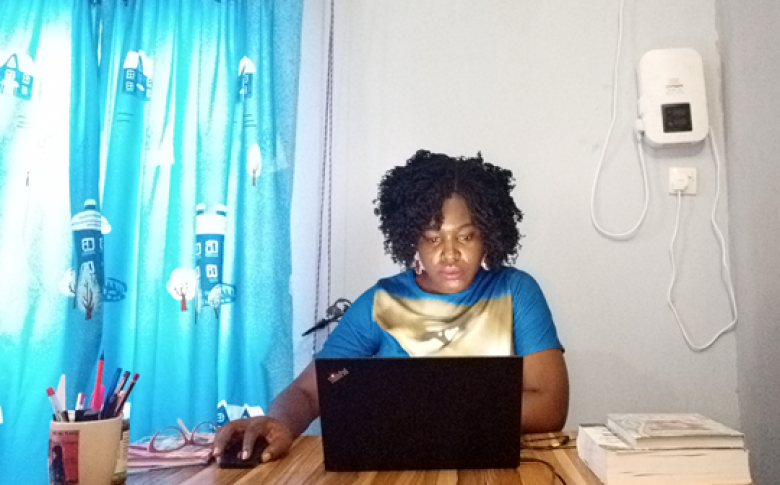Serving responders amid COVID-19: Oyintare Kalama

Early April and the Red Roof humanitarian hub – home to ETS staff, as well as all responders from United Nations (UN) agencies and humanitarian organizations in Maiduguri – seemed quieter than usual. The usual bustle and the numerous activities have now quietened as most staff are working from home. It is a challenging time for the ETS team as they face an invisible yet global challenge: COVID-19. With only critical staff reporting to the office, ETS personnel share their thoughts on serving the humanitarian community during this pandemic, but this time, remotely.
The newly-recruited Information Management (IM) Associate, is one of a few women who decided to work in conflict-ravaged area of North-East Nigeria. Known as Tarex, the native Nigerian was aware of the volatile security situation in the region, but she never expected that there would be another challenge to face such the current COVID-19 outbreak. “This is my first experience being in a conflict area during a pandemic,” Tarex says.
She plays a crucial role in sharing key operational information and stories from the field to showcase the impact of ETS services on responders’ lives in this unique emergency context.
During the COVID-19 outbreak, Tarex must work from home. “Although I’m required to work from home, I have been able to carry out most of my activities as usual. There’s a lot of teleconferencing going on, I still provide my weekly updates and inputs for SitReps [Situation Reports] and having the duty officer phone, I respond to any request for information and direct requests for support to other team members.”
Working remotely doesn’t lessen Tarex’s commitment in assisting the humanitarian community on the ground: “I’m super committed to my job. The truth is, working from home has made me think out of the box. I keep doing what I have to do to ensure we stay on track.”
She admits that working remotely poses its own challenges, such as the lack of constant power supply in the area, which forces her to use up a lot of fuel to keep her generator running. The other challenge is the occasional feeling of isolation: “I live alone, so there’s no one to chat with when you need a break, unlike the office environment where you take a break and chat with colleagues when you begin to feel stressed out.”
Tarex, however, doesn’t let this deter her in giving her best shot as she keeps reminding herself on her motivation in joining the team. “Being a part of the ETS, which provides reliable [Internet] connectivity and security communications to enable humanitarians to work more efficiently and securely, is enough motivation [for me].”